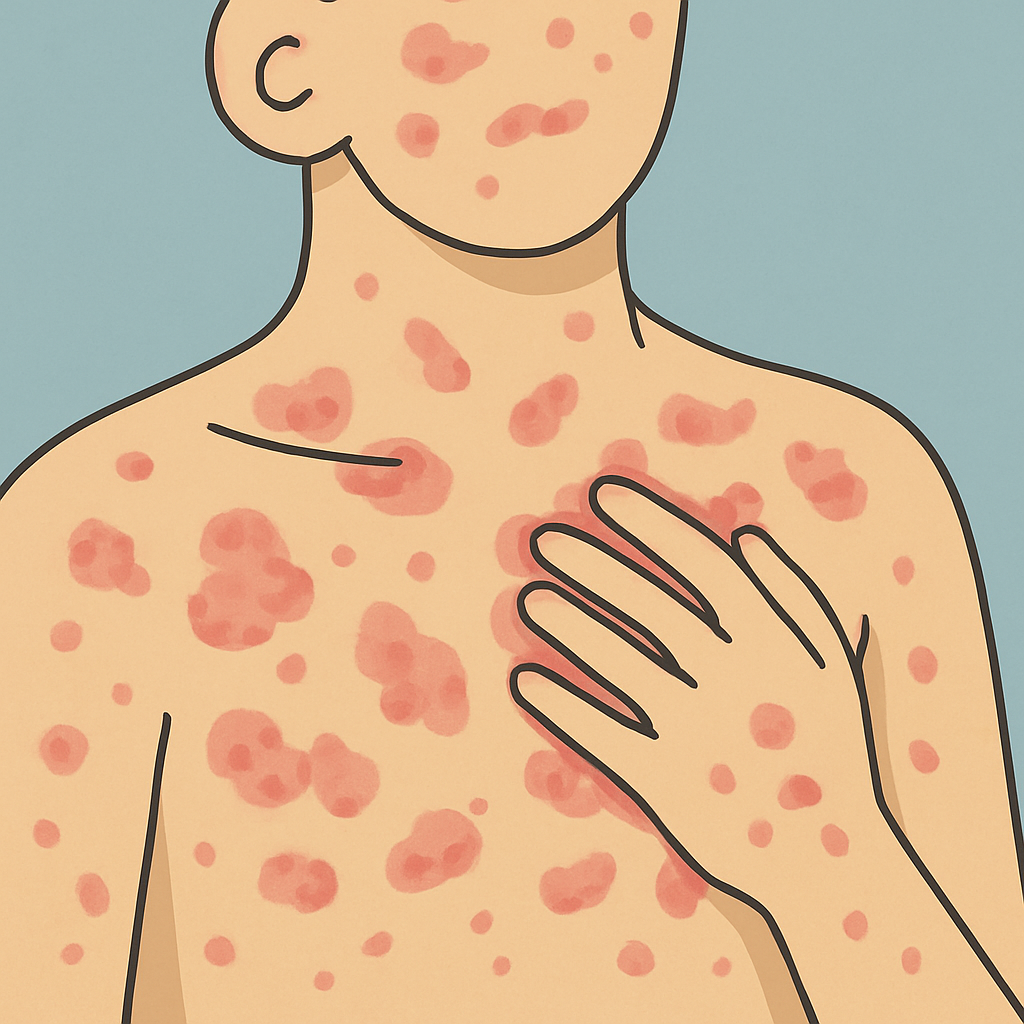Effective Treatments for Urticaria: Omalizumab, Antihistamines, and Long-Term Therapy


have already shared their stories
Urticaria, commonly known as hives, is a skin condition characterized by itchy, raised welts that can cause significant discomfort. Managing urticaria effectively requires a comprehensive approach that may include medications like Omalizumab, antihistamines, and long-term therapy options. In this blog post, we will explore various urticaria treatments, including how long Omalizumab takes to work, the best antihistamines for urticaria, and long-term therapy for chronic urticaria.
Understanding Urticaria
Urticaria can be acute or chronic, with chronic urticaria usually lasting more than six weeks and sometimes persisting for months or years. The condition can be triggered by various factors, including allergens, stress, infections, or underlying health conditions. Effective treatment aims to relieve symptoms and address underlying causes.

How Long Does Omalizumab Take to Work?
What is Omalizumab?
Omalizumab, known by the brand name Xolair, is a monoclonal antibody used to treat chronic idiopathic urticaria (CIU) that does not respond to standard antihistamine therapy. It works by targeting and inhibiting IgE, an antibody involved in allergic reactions.
Effectiveness Timeline
Patients often wonder, "How long does Omalizumab take to work?" The answer varies, but many patients start to see improvement within the first few weeks of treatment. Some may experience relief as early as one to two weeks, while for others, it may take up to three months to notice significant changes. Consistent use as prescribed by a healthcare provider is crucial for achieving optimal results.
Best Antihistamines for Urticaria
First-Generation Antihistamines
First-generation antihistamines, such as diphenhydramine (Benadryl), are effective but can cause drowsiness and other side effects. These are often used for acute episodes or nighttime relief due to their sedative effects.
Second-Generation Antihistamines
Second-generation antihistamines are preferred for long-term management of urticaria due to their lower risk of sedation. Some of the best antihistamines for urticaria include:
- Cetirizine : Effective for reducing itching and hives, cetirizine works within an hour and lasts for 24 hours.
- Loratadine : Another non-sedating option, loratadine is effective for daily use without causing drowsiness.
- Fexofenadine : Known for its quick onset of action, fexofenadine is effective for managing chronic urticaria symptoms.
- Levocetirizine : A potent antihistamine that works quickly and is less likely to cause drowsiness.
Combination Therapy
In some cases, a combination of antihistamines may be used to achieve better control of symptoms. This can include taking a second-generation antihistamine during the day and a first-generation antihistamine at night.
Long-Term Therapy for Chronic Urticaria
Identifying Triggers
Long-term therapy for chronic urticaria involves more than just medication. Identifying and avoiding triggers is a crucial step. Common triggers include certain foods, medications, stress, and environmental factors. Working with a healthcare provider to pinpoint these triggers can help manage and reduce flare-ups.

Lifestyle Modifications
Implementing lifestyle changes can also help manage chronic urticaria. This includes:
- Stress Management: Techniques such as yoga, meditation, and regular exercise can help reduce stress, a known trigger for urticaria.
- Dietary Adjustments: Avoiding known food allergens and maintaining a balanced diet can prevent flare-ups.
- Skin Care: Using gentle, fragrance-free skin care products can help reduce irritation and prevent worsening of symptoms.
Advanced Medical Treatments
For patients who do not respond to antihistamines and Omalizumab, other advanced treatments may be considered:
- Immunosuppressants: Medications such as cyclosporine can be used to manage severe cases of chronic urticaria.
- Corticosteroids: Short-term use of oral corticosteroids may be prescribed for severe flare-ups, but long-term use is generally avoided due to potential side effects.
- Biologics: Besides Omalizumab, other biologics are being researched and may offer new treatment options in the future.
Conclusion
Effective management of urticaria requires a comprehensive approach that includes understanding how long Omalizumab takes to work, selecting the best antihistamines for urticaria, and exploring long-term therapy options for chronic urticaria. By working closely with healthcare providers and making necessary lifestyle adjustments, individuals with urticaria can achieve better symptom control and improve their quality of life. Always consult a healthcare professional for personalized advice and treatment plans tailored to your specific needs.

have already shared their stories
Sources
- Kaplan, A. P., & Giménez-Arnau, A. M. (2018). Acquired cold urticaria. The Journal of Allergy and Clinical Immunology: In Practice, 6(4), 1051-1058.
- Bernstein, J. A., Lang, D. M., Khan, D. A., Craig, T., Dreyfus, D., Hsieh, F., ... & Blessing-Moore, J. (2014). The diagnosis and management of acute and chronic urticaria: 2014 update. Journal of Allergy and Clinical Immunology, 133(5), 1270-1277.
- Zuberbier, T., Aberer, W., Asero, R., Abdul Latiff, A. H., Baker, D., Ballmer‐Weber, B., ... & Maurer, M. (2018). The EAACI/GA 2 LEN/EDF/WAO guideline for the definition, classification, diagnosis, and management of urticaria. Allergy, 73(7), 1393-1414.
- Kolkhir, P., Giménez-Arnau, A. M., Kulthanan, K., Metz, M., Magerl, M., Borzova, E., ... & Maurer, M. (2022). Urticaria. Nature Reviews Disease Primers, 8(1), 1-26.
- Maurer, M., Rosen, K., Hsieh, H. J., Saini, S., Grattan, C., Gimenez-Arnau, A., ... & Kaplan, A. (2013). Omalizumab for the treatment of chronic idiopathic or spontaneous urticaria. New England Journal of Medicine, 368(10), 924-935.









.avif)
